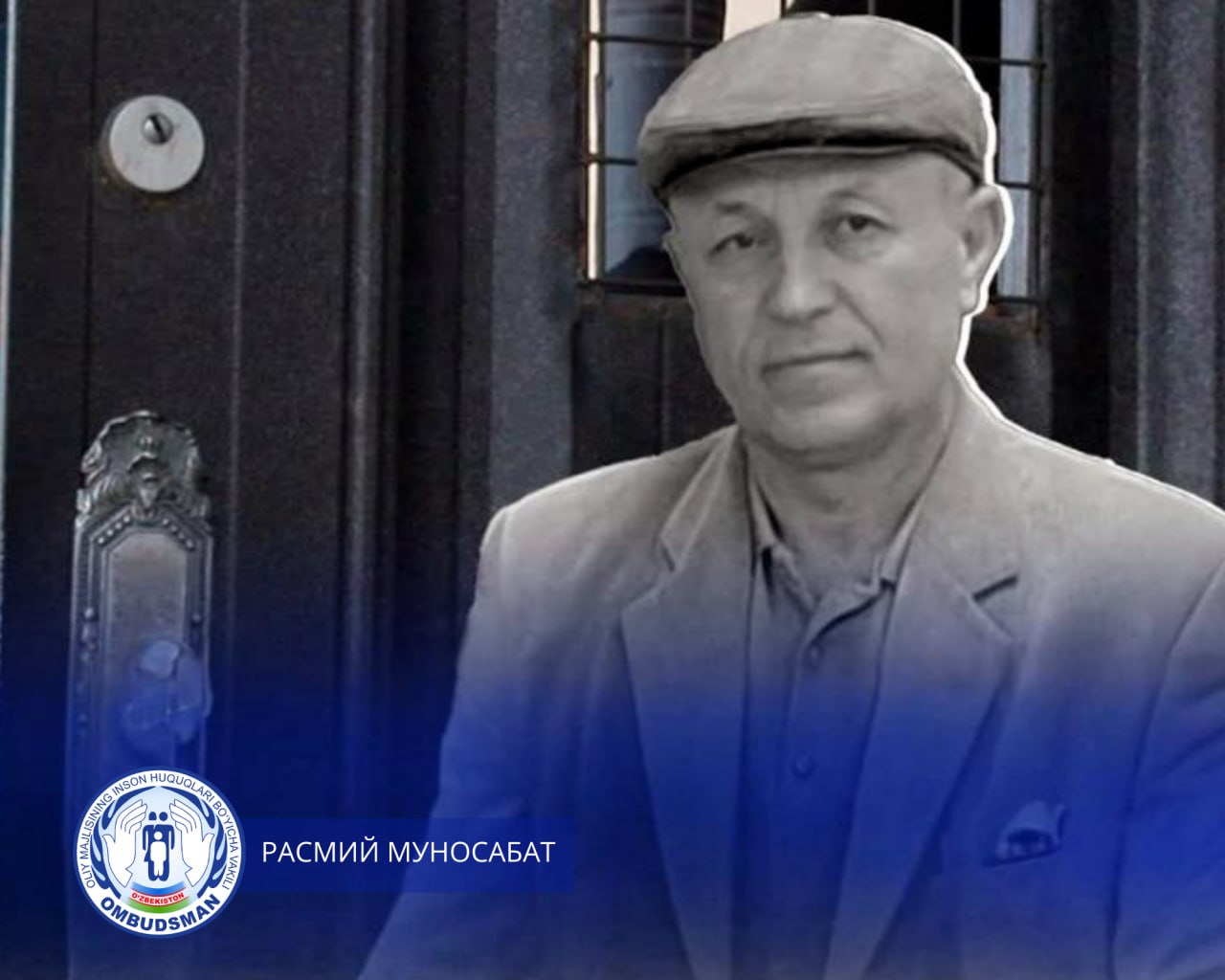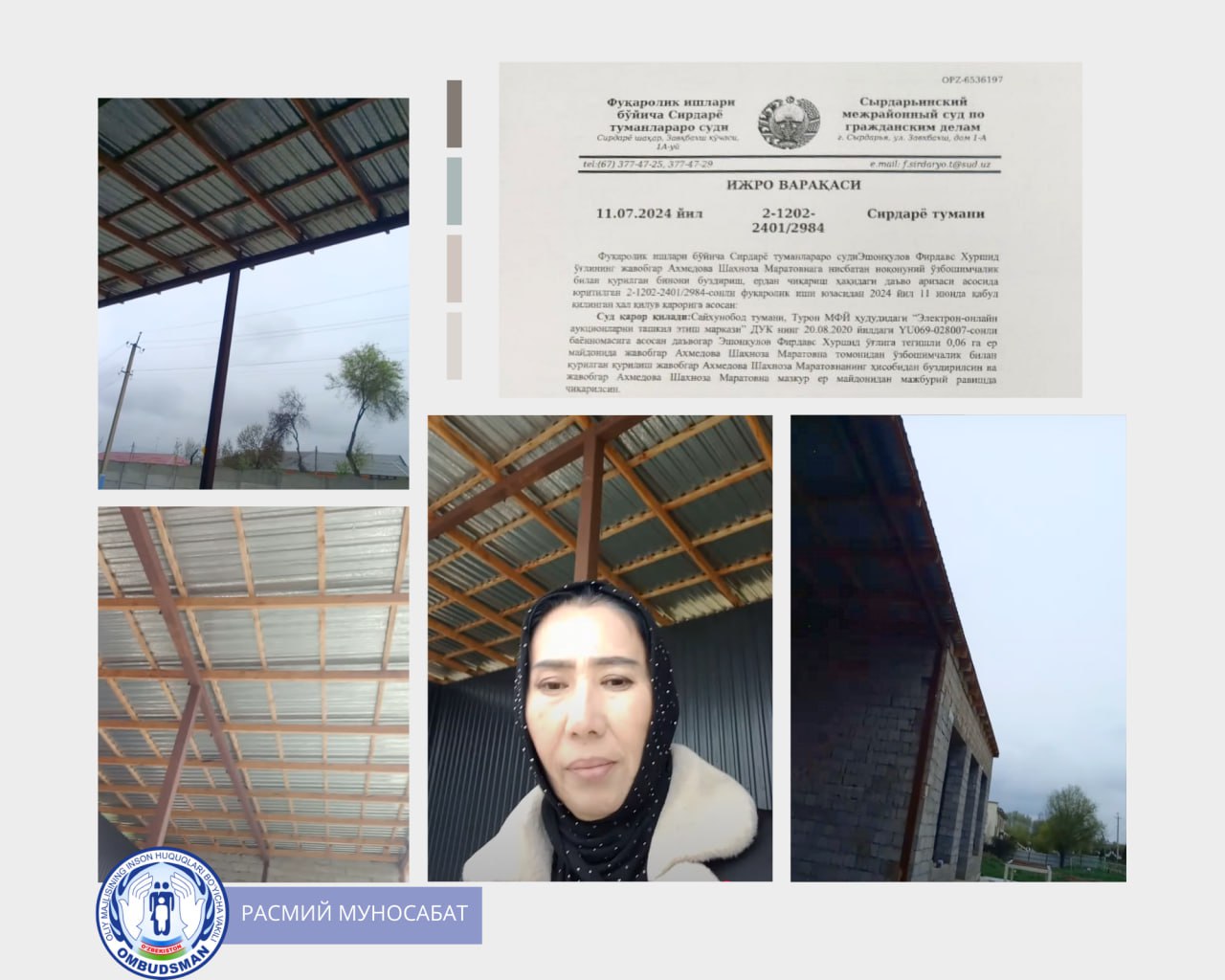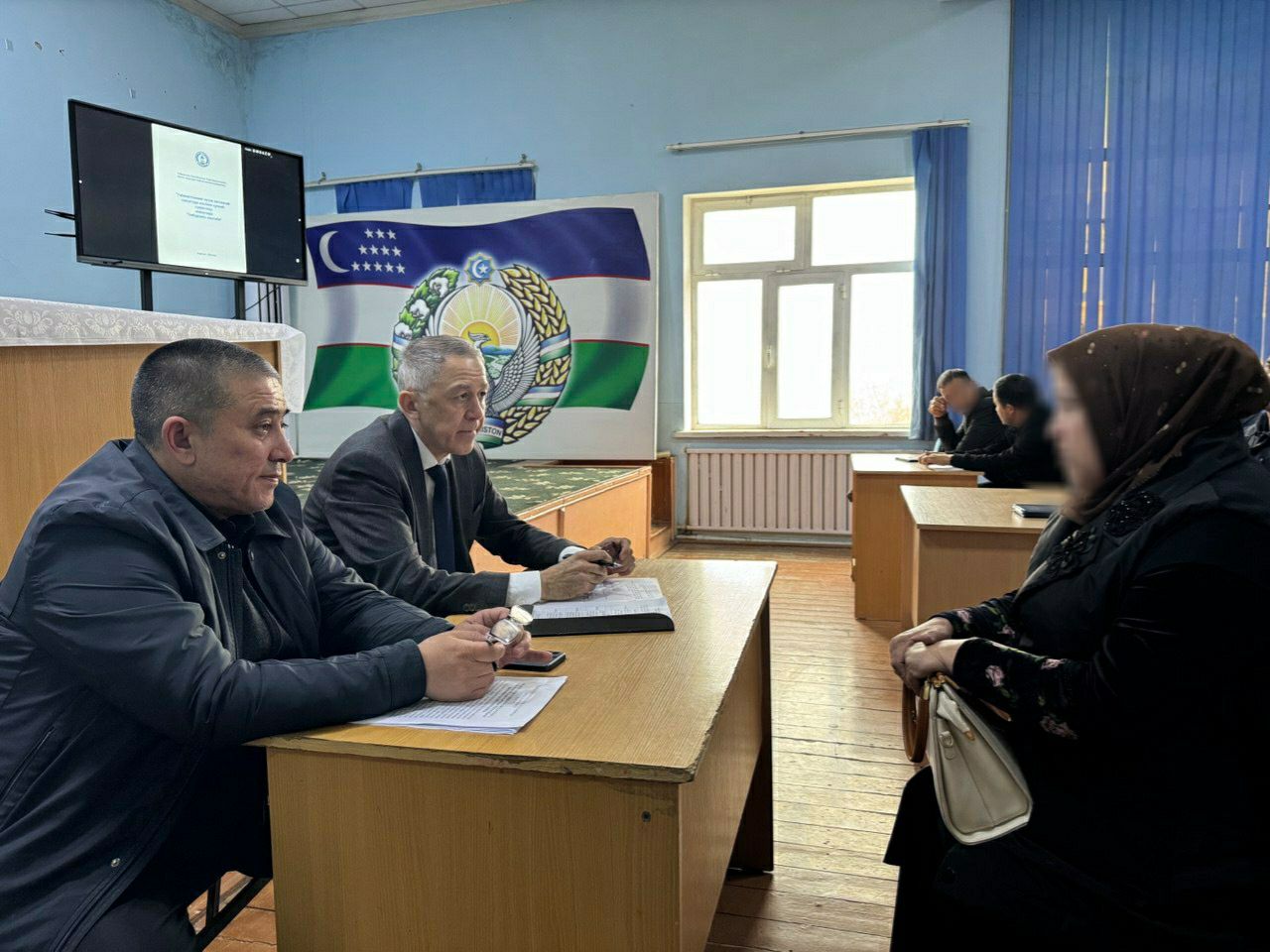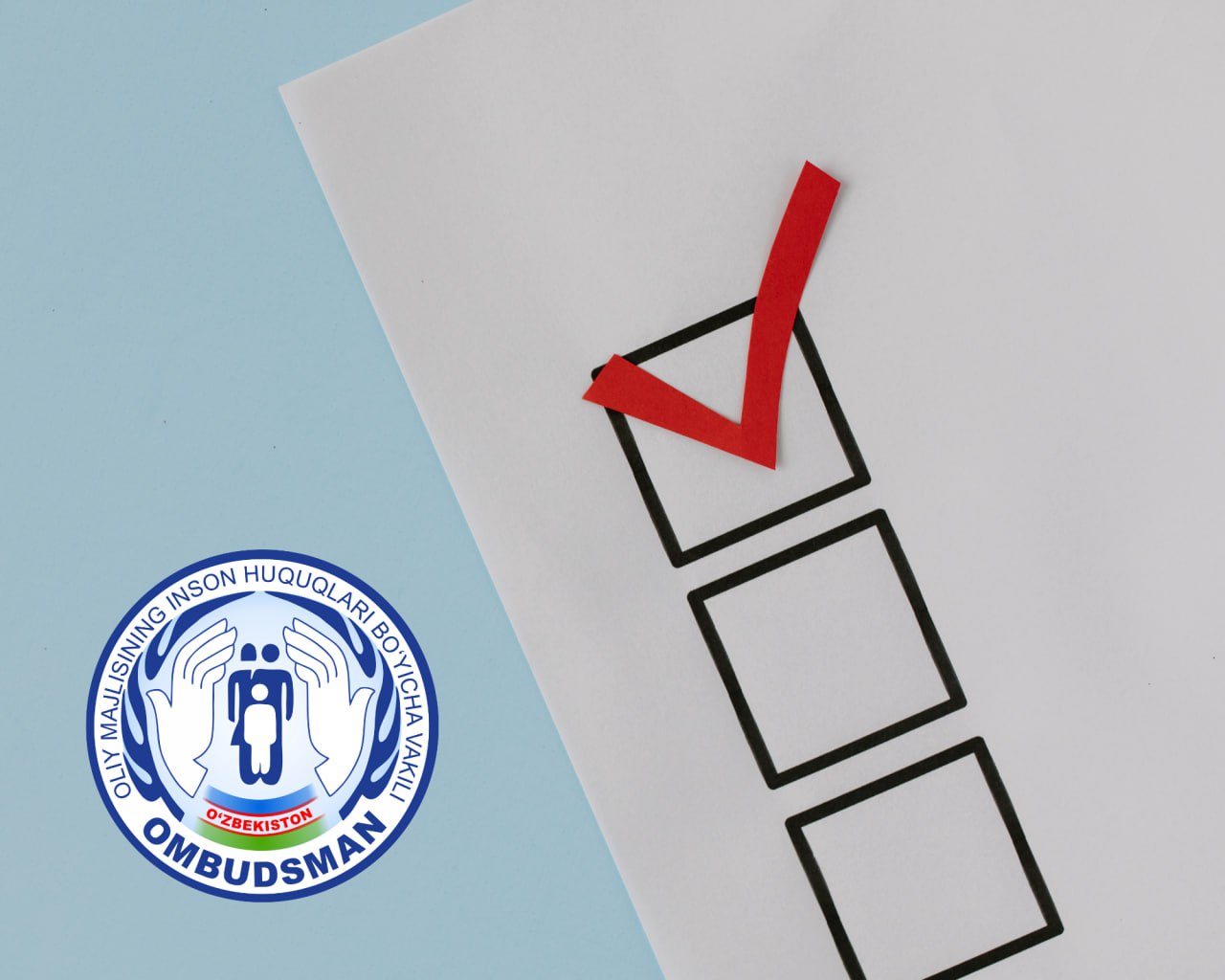During the 2020 pandemic, under the leadership of the Ombudsman, monitoring was carried out in penitentiary institutions 42 times, 9 times in temporary detention facilities, 8 times in law enforcement agencies, 6 times in pre-trial detention centers, 5 times in special reception rooms for administrative detainees, 2 times there were control visits to rehabilitation centers for the homeless, 4 times to quarantine complexes and centers specializing in the treatment of patients with coronavirus. They held collective meetings with more than 4,000 inmates in penitentiary institutions and individual meetings with 578 inmates.
It is known that the President of the Republic of Uzbekistan Sh.Mirziyoyev, in his message to the Oliy Majlis on December 29, 2020, emphasized that the Ombudsman, together with the public, should establish a system of “monitoring visits” in pre-trial detention centers and penitentiary institutions.
Strengthening the President's control over the prevention of torture, as well as studying the current situation in penitentiary institutions, pre-trial detention centers and special reception centers that people cannot leave voluntarily. In order to prevent torture and other cruel, inhuman or degrading treatment or punishment by the Expert Group, which consists of members of the public working under the leadership of the Ombudsman, on January 29 this year, within the framework of the National Preventive Mechanism, monitoring visits were made to penitentiary institutions No. 13 and 7.
The Expert Group, consisting of representatives of the public, includes members of the Commission on the Observance of Constitutional Rights and Freedoms under the Authorized Person of the Oliy Majlis for Human Rights (Ombudsman), including Azimov Saidbek, head of the Ombudsman's Secretariat, and Davronbek Muzrobov, leading specialist of the National Center for Human Rights , Mamatkhanov Askar, executive director of the national movement "Yuxalish", Nurmatov Bekzod, member of the central board of the society "Ezgulik", and Azamzhon Formonov, head of the public organization "Hukukiy tayanch".
The members of the expert group studied the living conditions, food, work and health of convicts serving sentences in penitentiary institutions of the Tashkent region, as well as compliance with sanitary and hygienic requirements in institutions. In accordance with the procedure established by the Criminal Code, each convicted person has the right to apply to the administration of a penitentiary institution or body, other state bodies and public associations in his native language or in another language for medical assistance, including to receive psychological assistance provided by the psychological service. of the penitentiary institution, to create a safe working environment in accordance with labor legislation.
Currently, about 1,100 convicts are serving their sentences in penal colony No. 13 of the Tashkent region. In total, there are 14 workshops on the territory of the institution, specializing in sewing, carpentry, production of upholstered furniture and other professions. If convicts are paid outside working hours and in full compliance with the daily rate, they will be paid 29 thousand soums a day. Those who exceed the norm are paid more and those who work less are paid a lower daily wage. It is important to note that liability for non-compliance with the established norm has not been established.
In a one-on-one conversation with a convict serving a sentence for 8 years, he said that he works 6 days a week, is not subjected to excessive forced labor on Sundays, and does not object to working conditions and wages. When asked about the salary, he said that it ranges from 900 thousand to 1 million soums, depending on the order.
There are 16 rooms with rooms for long family gatherings of prisoners. The colony has 5 telephones, according to the schedule, prisoners can talk with their relatives for up to 10 minutes on a paid basis. According to employees of the colony No. 13, in the coming days, prisoners will also be able to make online video calls.
During group meetings, convicts were explained in detail their rights and obligations and explained that they should contact the Ombudsman in case of discrimination against them. During individual receptions with convicts, they were asked about their treatment in the institution, whether there were cases of torture and other cruel, inhuman or degrading treatment or punishment, as well as about the conditions created for convicts.
Saidbek Azimov, head of the Secretariat of the Oliy Majlis Authorized Person for Human Rights (Ombudsman), said that during the monitoring, no complaints were received from prisoners about conditions of detention and torture.
“A schedule has been developed for monitoring visits to penitentiary institutions within the framework of the national preventive mechanism, and since this year these processes are being carried out jointly with the public and the media. I must say that taking into account the mental state of the prisoners, their wishes, we attracted fewer journalists to the first monitoring and, of course, the prisoners who did not want to be photographed during the filming were removed from the camera lens. During individual interviews with prisoners, there were no reports of torture or psychological discrimination against them. In my reception room, they mainly petitioned for amnesty, commutation by sentences not related to imprisonment.
During the visit, the members of the expert group also visited the Atlantic rehabilitation center, which has been operating since 2009, and got acquainted with the conditions created for the prisoners.
Azamjon Farmonov, member of the expert group and chairman of the Public Association "Legal Foundations of Human Rights of Uzbekistan":
- Once I was serving a sentence in one of the prisons of Uzbekistan in the Jaslyk prison on trumped-up charges. The fact that I am a member of the Commission under the Ombudsman is a great political event. The reason is that most of the time, government agencies received many orders, even when I was serving my sentence, but they do not feel the situation in this zone the way we do. I arrived today at these colonies No. 13 and 7 and got acquainted with the conditions of detention and the agenda of the convicts. I even had the opportunity to speak face to face with some of the prisoners. In fact, the conditions here are strikingly different from those of 3-4 years ago. Their living conditions improved and they were given the opportunity to pursue different careers. In the penal colonies, I draw attention to the state of mental and physical torture. Today I have not heard of any mental or physical torture from prisoners. Of course, we were not able to speak with every prisoner, but although partially, our monitoring is still ongoing. The world community and international organizations publish messages on social networks that mental and physical torture continues in the penitentiary institutions of Uzbekistan. I think that in the future we will investigate the situation based on such reports. I also spoke with convicts serving sentences under Articles 159 and 244 of the Criminal Code. When I told them that I was a former convict and that they could tell me without hesitation whether torture had been used, they said that there was no torture, as before, they were tormented only by the lack of freedom, they miss their families.
I really got to know their living conditions, food and other conditions personally and did not find a single unsatisfactory situation. It should be noted that in all penitentiary institutions there is an “Ombudsman's box” so that convicts can timely apply in case of pressure or other unlawful circumstances, and only Ombudsman specialists have the right to open it personally.
During the monitoring visit, the head of the Secretariat of the Authorized Person of the Oliy Majlis for Human Rights (Ombudsman) S. Azimov personally accepted the appeals received in the “Ombudsman's box” installed in penitentiary institutions.
The heads of the relevant institutions were given the necessary recommendations to eliminate the shortcomings identified in the course of the study. The Ombudsman and the Ombudsman's Panel of Experts, composed of members of the public, will continue to monitor prisons and pre-trial detention centers.
Press Service of the Authorized Person of the Oliy Majlis
for human rights (Ombudsman)



























